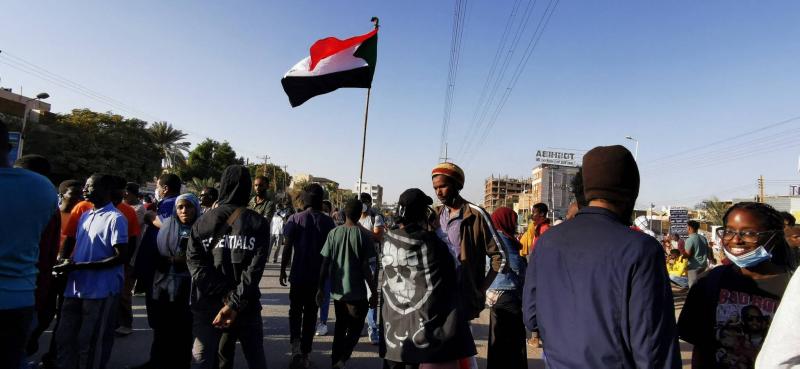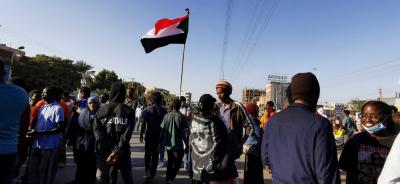Those without experience in the Sudanese interior may feel lost, as the geographical data is the only constant: it is an Arab country located in the Northeastern region of Africa. It borders Egypt to the north, Libya to the northwest, Chad to the west, the Central African Republic to the southwest, South Sudan to the south, Ethiopia to the southeast, Eritrea to the east, and the Red Sea to the northeast. It is the third-largest country by area in Africa and in the Arab world, prior to the separation of the south. Most importantly, the Nile Basin runs through its center, meaning any security disturbance could threaten the entire continent’s financial resources. Aside from this, one cannot discern who is aligned with whom… whether the dominance lies with political parties or movements, popular committees or "war lords," or if influence rests with the U.S., China, Wagner forces, Israel, or the wealthy mine owners. All these paths lead to endless doors, with hypotheses pointing to hidden forces maneuvering within the Sudanese arena, represented by the "Kizans." What are the shortest paths to understanding what is going on there?
In a country with 49 million citizens, following the establishment of the modern state formed during two colonial eras: the Mahdist Occupation (1821-1885) and the British Occupation (1898-1955), and after nearly six decades of independence, seven constitutions, six democratic elections, three periods of civilian rule, three military regimes, four transitional periods, three civil wars, and seven peace agreements, one cannot overlook the rise of religious currents that have bolstered tribalism and sectarianism, alongside the services of tribal leaders and Sufi order sheikhs, aimed at controlling the country rich in natural resources, while the Sudanese people continue to suffer from poverty and hunger due to international sanctions and await the promised "civilian rule."
Islamic movements surged during the presidency of Sudan's fourth president, Jaafar Nimeiri, and then under the former President Omar al-Bashir, amid the support of the Islamic Front led by Hassan al-Turabi, with most of them leaning towards the notion that "the political seat comes before religion sometimes." Political experts from within the country mostly agree that an alliance of certain Islamic forces with Nimeiri in the latter years of his rule led to the adoption of the September Islamic Laws in 1983, resulting in violent practices and the beginning of a division that manifested in the south's secession. After the ousting of Nimeiri, the role of Islamic movements diminished until their return through the coup led by al-Bashir, who welcomed al-Qaeda leader Osama bin Laden in Khartoum with the blessing of Turabi and other Islamic leaders, opening the doors to groups and individuals classified on global terrorism lists. In the south, a number of these movements led wars that resulted in thousands of deaths under the pretext of ethnic cleansing in the Darfur region, causing immeasurable tragedies. In this context, Sudanese political writer Khalid al-Tijani al-Nur refers to a statement by the leader of the Republican movement, Mahmoud Taha, who was executed during Nimeiri's reign, stating: "It is better for the Sudanese people to experience the rule of the religious fanatic group. It will be a very useful experience. Undoubtedly, it will reveal the falsehood of this group's slogans. This group will control Sudan politically and economically, even through military means. They will put the people through tough times and will plunge the country into a conflict that turns its day into night. This will ultimately lead to their downfall and they will be uprooted from Sudan."
While former Prime Minister Al-Sadiq al-Mahdi tried to put an end to decades of civil war between the north and south by endorsing a peace agreement that aimed to halt disputes and freeze the Islamic laws enacted by Turabi, al-Bashir’s coup in 1989 performed the act of showcasing the Brotherhood's influence, introducing new terminology to the arena, most notably "Kizans." The phrase "Religion is an ocean and we are its Kizans" gained notoriety amid the rise of Islamic movements in Sudan, especially during al-Bashir’s era. This means that Islamists scoop from the inexhaustible ocean of religion using a 'kizan' – a vessel used to drink or pour from. The term resurfaced again during the Sudanese revolution in 2019, which aimed to uproot al-Bashir and his associates from the "Kizans."
Throughout different epochs, the military institution, leftist movements, and both Islamic and regional forces have allied despite their differing objectives, solely to reach power at the cost of the people, as exemplified by the Sudanese man standing on the ruins of his home and resources, lamenting and questioning, "What is my fault?" following days of recent clashes between the Rapid Support Forces led by Mohamed Hamdan Dagalo, known as Hemedti, and the Sudanese army led by Lieutenant General Abdel Fattah al-Burhan, who heads the transitional sovereign council ruling Sudan since the ousting of Abdullah Hamdok's government in October 2021. Amid subsequent divisions: the traditional institution represented by the Umma Party and the Federalists, in addition to modern party currents and rebellious factions and military institution interests.
Returning to the division, in 2011, signs of Sudan's partition resurfaced against the backdrop of the political system's failure to accommodate the diversity of its social composition and its incapacity to address the imbalances in fair participation in power and wealth. Former Sudanese Foreign Minister and deputy head of the Umma Party, Mariam al-Sadiq al-Mahdi, asserts that the conflict between Burhan and Hemedti represents the greatest threat to the political process, emphasizing that the internal strife within the military component itself could jeopardize the political trajectory.
As for why the "Kizans" ignite the flames of the recent war, there is speculation that the move towards a civil state would strip them of their power in light of the country’s collapsing economy, the plummeting value of the Sudanese pound, and the boycott by international financing institutions such as the International Monetary Fund and the World Bank. Additionally, the Sudanese people, revolutionaries, and political entities will not accept the halt of a political process that was close to a final political agreement and the formation of a new government acceptable to the majority of Sudanese. Therefore, the outbreak of violence at this juncture is driven by a sense of dwindling time, causing Islamists to lose hope of returning to the chair that was toppled by the popular revolution. A Sudanese woman states: "I will not turn into a false witness to lend this war any national or moral legitimacy, knowing its objectives and that yesterday's comrades are today’s enemies, and I know that the victor will establish a tyranny that warrants resistance, and we will resist it if we remain alive."




